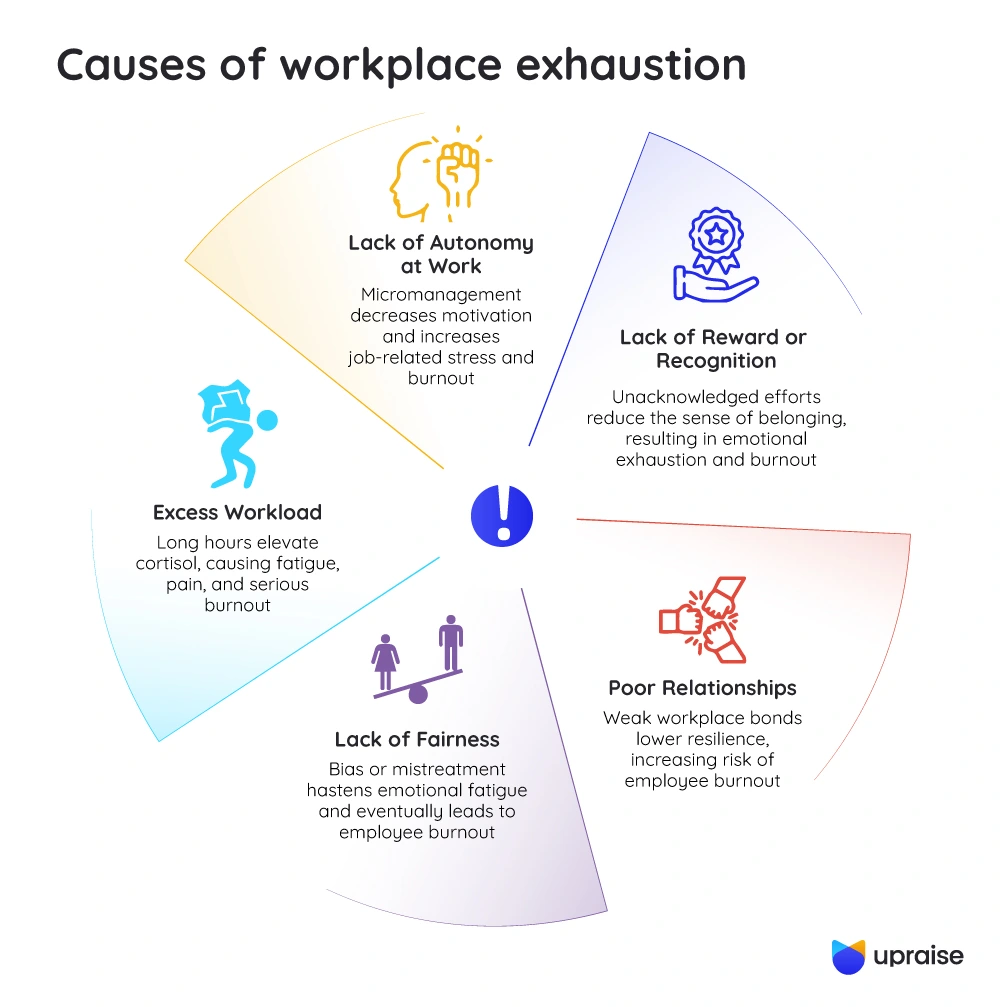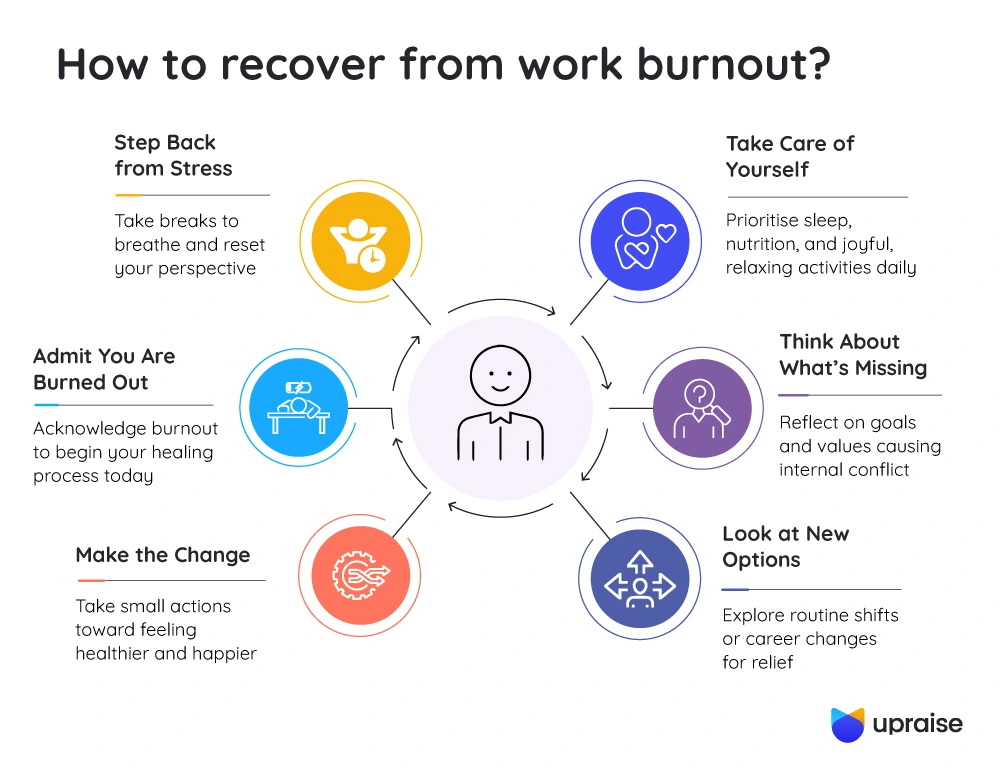Ever felt completely drained at work, struggling to focus, or unmotivated? Those are signs of burnout at work. Burnout is a state of mental, physical, and emotional exhaustion. It’s also the most common problem in modern work culture due to stiff market competition. According to a recent survey of HR leaders, up to 50% of attrition can be attributed to burnout.
Burnout at work can result from many different things. But there are ways to prevent it. And if someone is already affected, there’s also a proven course of action to help them out.
What is work burnout?
Work burnout means when your job leaves you feeling completely tired, stressed, and unmotivated. It’s like your work feeling overwhelmed every day, no matter how much rest you get.
A Deloitte survey found that 77% of professionals have faced burnout at their current job. Remote workers are even struggling more, and research indicates that 86% of remote employees experience high levels of exhaustion due to difficulties in disconnecting from work.
Burnout does not just affect your mood. Burnout can lead to mental health challenges like anxiety and depression as well as physical issues such as fatigue and weakened immunity. It’s important to find and address burnout easily to maintain overall well-being.
Signs of burnout at work (Infographic)
Here are some clear signs of burnout at work.
- Work feels meaningless, and starting tasks feels hard.
- You feel distant from colleagues and work responsibilities.
- Small issues at work feel frustrating or overwhelming.
- You feel exhausted even after resting.
- Staying on task feels difficult, and mistakes increase.
- Work feels unfulfilling, and achievement seems unimportant.
- Self-doubt increases in yourself, and you start questioning your skills and abilities.
There are many causes for burnout. Let’s look at a few common ones.
Causes of workplace exhaustion
Work burnout is a gradual process that builds up over time due to numerous factors. At first, it might feel like a tough week at work, but if left unchecked, it can severely impact employees as well as the organization. There are five main reasons why employees feel burnout at the workplace.

Excess workload
Surprisingly, millions of people die every year because of working for too many hours. Excess work pressure induces weight loss, body pain and high levels of cortisol in individuals. Being unable to manage a healthy lifestyle triggers burnout in employees.
Lack of autonomy at work
Autonomy at work is very important for an employee’s mental well-being. If employees are constantly micromanaged, they can feel demotivated and lose meaning in their jobs. This eventually leads to burnout.
Lack of reward or recognition
Employees like their every sincere effort to be recognized for self-motivation, not just for promotion. If they don’t get that, they start to lose their obligation to the greater organizational mission. Without a sense of belonging at work, they slowly go through different stages of burnout.
Poor relationships
According to a Gallup poll, employees with good social connections at work have higher stress management capabilities. If employers do not pay attention to such social needs and do not give space to employees to connect around non-work related topics, employees feel burnout.
Lack of fairness
When employees face bias, mistreatment, unfair compensation, or corporate policies, they are likely to burn out. Even racial or gender bias can also boost the chance of burnout.
Besides understanding the root causes, it’s also important to acknowledge different stages of burnout to take the correct approach for faster recovery.
Stages of burnout
There are five different stages of burnout as follows:
- Honeymoon phase: You start with high energy and motivation, eager to take on more work. You say “yes” to everything, which will eventually lead to over-commitment.
- Early stress signs: Some days start feeling more stressed than others. You may notice fatigue, anxiety, or small dips in work performance.
- Chronic stress: Stress becomes a daily struggle. You feel irritable, start avoiding social interactions and may even lose interest in personal relationships.
- Full burnout: You feel mentally and physically drained, neglect personal needs and struggle with feelings of emptiness.
- Long-term burnout: Burnout becomes the new normal for you. If ignored, it can lead to serious health problems, both mental and physical. Let’s understand that in detail in the next section.
As burnout progresses through these stages, it doesn’t just affect the work output but also affects the health entirely. In the following section, let’s discuss how burnout affects work and health.
Effects of burnout on work and health
Burnout has a significant influence on different aspects of your personal and professional life:
Physical health: Those with chronic burnout are at greater risk of developing heart problems, including coronary heart disease and high cholesterol. Furthermore, burnout has been linked to higher chances of type 2 diabetes and insomnia.
Mental health: Research has linked burnout to higher rates of anxiety and depression. Some people may start to turn to unhealthy coping mechanisms like drinking and smoking.
Cognitive function: Burnout affects both your emotional state and cognitive function. Recent studies showed that fatigued people have problems with concentration and memory which makes it difficult to work and make decisions.
Work performance: Burnout results in reduced employee productivity, increased leaves, and low employee satisfaction. This can lead to increased attrition and low productivity of the employees.
These effects show why it is crucial to recognize and manage the symptoms of job burnout as early as possible.
How to prevent job burnout
The best way to handle burnout is to address it before it even starts. The first step is to boost the work culture to foster a positive workplace and an enthusiastic team.
Stop pushing too much work on your star employees
We all have those superstar employees. The ones who jump at the chance to take on new projects and who never “cry uncle” when the going gets tough. They are worth their weight in gold, and we wish we had ten more like them. As leaders and managers, you need to remember that these employees have their limits too.
Be mindful of both – the number and complexity level of the projects you delegate to them. Seek continuous feedback to make sure they are not headed for burnout.
Foster team spirit
Often, employees who feel burdened withdraw from social activities and team-building exercises. This sense of detachment puts them at an even greater risk of burnout.
Look for ways to draw them into the team camaraderie. Be it team outings or any other events. Get them back into the spirit of collaboration, and they will be more likely to connect with others. They will even start leaning on their colleagues for support rather than slowly burning out in silence.
Communicate efficiently
Nearly $40 billion is wasted every year in the U.S. workforce in unnecessary meetings. Think about it – how many meetings and discussions have you suffered through? Could they have been replaced with an email or two?
As inboxes and calendars fill up, employees are forced to work extra hours just to manage their workload. Wordy, redundant emails waste time, as do meetings without set agendas. Communicate frequently with your team, but do it well. Be succinct and purposeful, and your employees will thank you.
How to recover from work burnout?
If you can already see signs of burnout at work, consider following these steps for a quick recovery.

- Admit you are burned out: You can not fix what you acknowledge. Accept that things need to be changed.
- Step back from stress: If possible, take a break, a day off, or even just a few hours to breathe.
- Take care of yourself: Get more sleep, eat good food, or do something that makes you feel happy and relaxed.
- Think about what’s missing: What’s making you feel stuck? Analyze if your goals and values are aligned with your current situation.
- Look at new options: maybe a small change, like adjusting your routine, or a bigger one, like switching jobs, could help.
- Make the change: once you know what you need, take action. Even small steps can help you feel better.
Conclusion
Burnout is not just feeling tired. It’s a signal that something needs to change. Identify the early signs of job burnout and take action before it gets worse. Set boundaries, focus on self-care, manage workload and seek support when you feel workplace exhaustion. It helps maintain both health and productivity. Pushing through workplace exhaustion only makes it worse. Prioritize well-being, make necessary adjustments and create a balanced work life that keeps you motivated and fulfilled.
FAQs
1. How can you avoid burnout at work?
Burnout happens when work takes over everything. You should try to keep office time and personal time separate. But it’s not ending here. You can do some moderate exercises, spend time in nature, meditate and practice calming exercises such as yoga. These habits are more effective and help to reduce burnout easily.
2. How can you recover from burnout while still working?
If you feel overwhelmed in the middle of the work, all you have to do is to shift your focus inwards from the external world. Focus on your breathing for the next five to ten minutes. It will recharge your brain to handle additional stress for the next hour or two.
3. Is work burnout considered a medical condition?
As per the World Health Organization (WHO), burnout is not a medical condition. It comes under the “Occupational Phenomenon,” meaning a work-related issue that can seriously affect an individual’s health and cause problems like heart disease and depression.
4. How does burnout affect work performance?
Burnout drains energy and focus, making work feel harder. According to some reports, 72% of employees say it hurts their performance. It also pushes people to quit.
